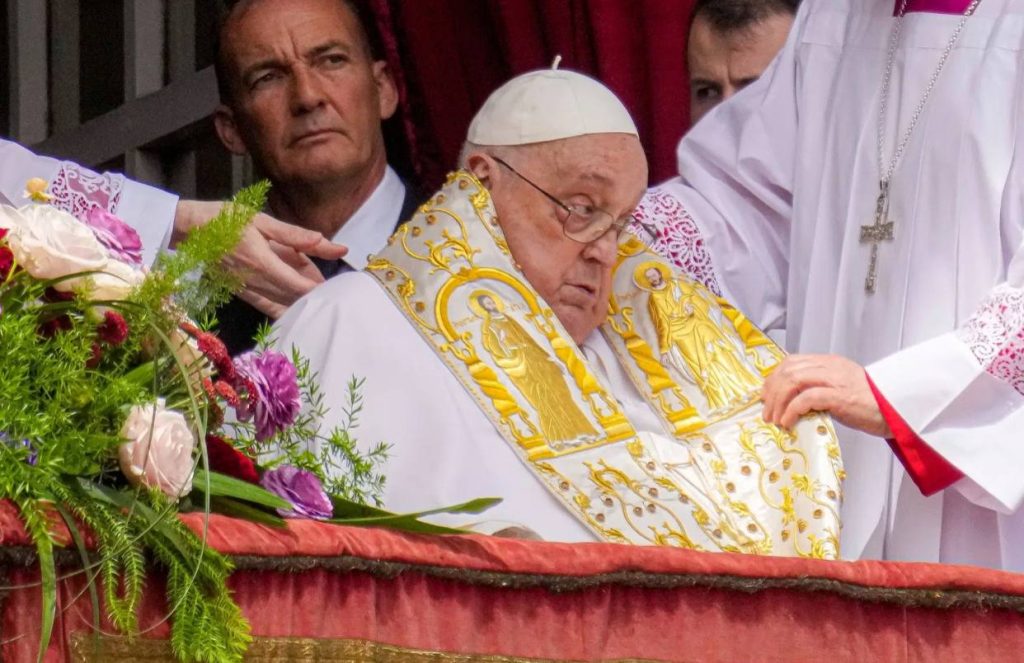VATICAN CITY (AP) — Pope Francis, the first Latin American pontiff and a transformative figure in the Catholic Church, has died at the age of 88. His passing comes just weeks after his final public appearance on Easter Sunday, marking the end of a 12-year papacy defined by humility, social justice, and bold reform.

“At 7:35 this morning, the Bishop of Rome, Francis, returned to the home of the Father,” Cardinal Kevin Farrell, the Vatican camerlengo, announced. “His entire life was dedicated to the service of the Lord and of his Church.”
A Different Kind of Pope
Jorge Mario Bergoglio of Argentina became Pope Francis on March 13, 2013, following the resignation of Pope Benedict XVI. From his first words — a simple “Buonasera” to the crowd in St. Peter’s Square — Francis set a new tone for the papacy. His approach was grounded in simplicity, compassion, and a commitment to the marginalized.
He made headlines for living in a Vatican guesthouse rather than the Apostolic Palace, wearing plain black shoes instead of papal red, and driving a modest car. He chose his papal name in honor of St. Francis of Assisi, patron saint of the poor and the environment — a symbolic nod to the values that would define his leadership.
A Voice for the Marginalized
Pope Francis tirelessly advocated for the poor, migrants, prisoners, and the disenfranchised. He visited war-torn regions, refugee camps, and impoverished communities across the globe. His first papal trip was to Lampedusa, an island at the center of Europe’s migration crisis.
He called for a more inclusive church, famously asking, “Who am I to judge?” when referring to gay Catholics. Under his leadership, the Church took a softer stance on issues such as same-sex blessings and divorced Catholics, and he invited women into higher decision-making roles — though he stopped short of opening the priesthood to them.
Challenging the Status Quo
While progressives praised his openness, conservatives viewed him with suspicion. Francis criticized unregulated capitalism, supported climate action, and approved a historic — and controversial — agreement with China on bishop appointments.
He was both beloved and vilified for taking bold stances: calling the death penalty inadmissible in all circumstances, condemning nuclear weapons, and urging nations to rethink economic systems that “turn the powerful into predators.”
A Troubled Legacy on Abuse
One of Francis’ greatest challenges was addressing the global clergy sex abuse crisis. While he initiated reforms, including a commission on abuse and changes to Vatican law, critics say his response was often inconsistent.
In 2018, he was forced to apologize after initially dismissing victims of a notorious Chilean abuser. Later, he accepted the resignation of that country’s entire episcopate and defrocked former Cardinal Theodore McCarrick after revelations of abuse.
Health Struggles and Final Days
Francis lived with chronic lung problems after losing part of a lung in his youth. His health declined in recent years, requiring multiple surgeries and the use of a wheelchair. He was admitted to Rome’s Gemelli Hospital in February 2025 with double pneumonia and spent 38 days there — the longest hospitalization of his papacy.
Despite his frailty, Francis made his final public appearance on Easter Sunday, a symbolic gesture of faith and perseverance.
Reforming from Within
Elected with a mandate to reform the Vatican, Francis took on the entrenched bureaucracy. He cleaned up Vatican finances, restructured key offices, and oversaw a high-profile corruption trial that saw the conviction of Cardinal Angelo Becciu.
He also reshaped church leadership worldwide, promoting pastoral bishops who prioritized service over status, and famously warned the Vatican Curia against “spiritual Alzheimer’s” and “the terrorism of gossip.”
A Pastor Until the End
Throughout his life, Francis sought to model the church as a “field hospital after battle” — a place of healing, not judgment. Whether embracing the disabled in St. Peter’s Square, praying alone during the COVID-19 lockdown, or blessing a Holocaust survivor’s tattoo, he embodied mercy in action.
Francis’ papacy was not without contradiction, but his moral clarity and focus on the poor elevated him as a spiritual leader beyond the Catholic Church.
“We are all in the same boat,” he said during the pandemic. “We must row together, each of us in need of comforting the other.”
Pope Francis is survived by the global Church he helped transform — a Church more open, more human, and still wrestling with the legacy of a pope who defied expectations until the end.